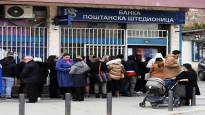The ban on the use of dinars and the transition to the euro upsets part of the Serb population in Kosovo.
The diverse tensions in the Balkans are also reflected in monetary policy
In some of the Serbian areas of Kosovo, pensions, public sector salaries and social benefits have been paid in dinars.
According to the currency reform, the only legal means of payment in Kosovo is the euro. The Serbian dinar is therefore no longer valid for payment.
Serbia still opposes Kosovo’s independence and has maintained two parallel systems in, for example, schools and healthcare. Kosovo has a Serb population of about 100,000. Especially those living near the Serbian border still prefer the dinar.
Now the Kosovo government has banned the importation of cash currency in order to phase out the dinars. According to Kosovo, the change aims to eradicate widespread organized crime. The Mafia prefers cash as a means of payment due to its more difficult traceability.
Kosovo declared independence in 2008 after the Balkan conflicts of the 1990s.
Cash in some places at the end
Residents of the border region seek cash from the Serbian side. For example, there are long queues in front of Postisäästöpanki. The bank is the only one to pay pensions and public sector salaries.
The bank has set a withdrawal limit of 85 euros.
– The pension is late, the bills are not, the nurse told news agency AFP Snezana Vujovic.
The roads of border towns such as Kursumlija, Vranje and Bujanovac are occasionally congested due to money-seeking traffic.
Taxi drivers benefit from the situation. Bank rides have increased. 10 euros can be charged for a single trip.
A three-month transition period
The United States and many other Western countries have criticized the dinar ban.
However, the government of Kosovo wants to dismantle the double standards that maintain the disparity.
The Serbian population has three months to switch to using the euro.
Dual currency also creates a headache for entrepreneurs.
– I can’t buy wholesale goods with euros and sell them on with dinars, says the vegetable seller Ferdi Ahmeti.
Ahmeti wishes for one currency, whatever it may be.
AFP
